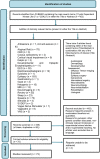International Consensus Recommendations for the Assessment and Management of Individuals With CDKL5 Deficiency Disorder
- PMID: 35795799
- PMCID: PMC9251467
- DOI: 10.3389/fneur.2022.874695
International Consensus Recommendations for the Assessment and Management of Individuals With CDKL5 Deficiency Disorder
Abstract
CDKL5 Deficiency Disorder (CDD) is a rare, X-linked dominant condition that causes a developmental and epileptic encephalopathy (DEE). The incidence is between ~ 1:40,000 and 1:60,000 live births. Pathogenic variants in CDKL5 lead to seizures from infancy and severe neurodevelopmental delay. During infancy and childhood, individuals with CDD suffer impairments affecting cognitive, motor, visual, sleep, gastrointestinal and other functions. Here we present the recommendations of international healthcare professionals, experienced in CDD management, to address the multisystem and holistic needs of these individuals. Using a Delphi method, an anonymous survey was administered electronically to an international and multidisciplinary panel of expert clinicians and researchers. To provide summary recommendations, consensus was set, a priori, as >70% agreement for responses. In the absence of large, population-based studies to provide definitive evidence for treatment, we propose recommendations for clinical management, influenced by this proposed threshold for consensus. We believe these recommendations will help standardize, guide and improve the medical care received by individuals with CDD.
Keywords: CDKL5 deficiency disorder; Delphi methods; care guideline; consensus methods; cyclin-dependent kinase-like 5; developmental and epileptic encephalopathy.
Copyright © 2022 Amin, Monaghan, Aledo-Serrano, Bahi-Buisson, Chin, Clarke, Cross, Demarest, Devinsky, Downs, Pestana Knight, Olson, Partridge, Stuart, Trivisano, Zuberi and Benke.
Conflict of interest statement
JD Consultancy for Marinus, Ultragenyx, Avexis, Anavex, and Newron; any remuneration went to Telethon Kids Institute. MM works as a pediatric researcher with investigator initiated studies funded through industry (PTC Therapeutics). EP is on the advisory board of Marinus Pharmaceuticals and has consulted for Biomarin Pharmaceuticals and Zogenix. JC has acted as an investigator for studies with GW Pharma, Zogenix, Vitaflo, Ovid, Marinius and Stoke Therapeutics. She has been a speaker and on advisory boards for GW Pharma, Biocodex, Zogenix, and Nutricia; all remuneration has been paid to her department. Her research is supported by the National Institute of Health Research (NIHR) Biomedical Research Centre at Great Ormond Street Hospital. She holds as endowed chair at UCL Great Ormond Street Institute of Child Health; she holds grants from NIHR, EPSRC, GOSH Charity, ERUK, the Waterloo Foundation and the Great Ormond Street Hospital Biomedical Research Centre. SA has received funding from GW Pharmaceuticals, Norvartis, PTC Therapeutics, Boston Scientific, Nutricia, UCB, BioMarin, LivaNova, Medtronic, Desitin, Ipsen, CDKL5 UK, TSA and the National Institute for Health Research. HO received consulting fees from Takeda Pharmaceuticals and Zogenix regarding clinical trial design, Ovid Therapeutics regarding clinical trial results, Marinus Pharmaceuticals regarding CDKL5 Deficiency Disorder, and has done consulting for the FOXG1 Research Foundation. TB performed consultancy for Ovid, GW Pharmaceuticals, International Rett Syndrome Foundation, Takeda, Neurogene, Ultragenyx, Zogenix, GrinTherapeutics, Alcyone, Acadia, Neuren and Marinus; Clinical Trials with Acadia, Ovid, GW Pharmaceuticals, Marinus and RSRT; all remuneration has been made to his department. The remaining authors declare that the research was conducted in the absence of any commercial or financial relationships that could be construed as a potential conflict of interest.
References
-
- Paciorkowski AR, Seltzer LE, Neul JL. Developmental encephalopathies (2017). 10.1016/B978-0-323-37101-8.00032-1 - DOI
Grants and funding
LinkOut - more resources
Full Text Sources


